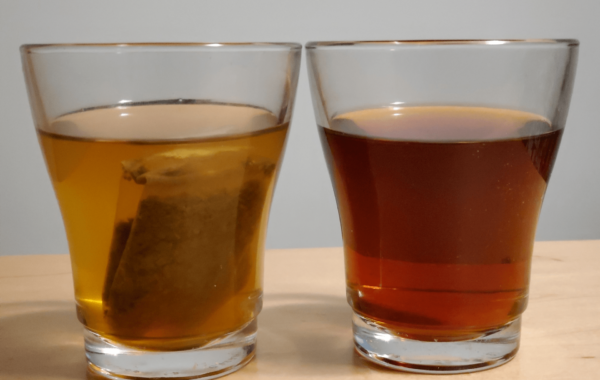
Green tea and coffee are popular beverages consumed by millions around the world. Research shows there are health benefits that can be derived from these drinks, such as the potential to reduce the risk of cancer.
In a review published in the journal Molecules in October 2020, researchers in the University of Shizuoka, and Nippon Medical School in Japan examined the research literature to explain the roles of the active compounds in green tea and coffee in their anti-cancer effects.
The main compounds researchers suspect could provide these anti-cancer effects are: epigallocatechin gallate (EGCG) in green tea, and chlorogenic acid (CGA) in coffee.
Green tea is made from the leaves of the tea plant. It contains a compound called epigallocatechin gallate (EGCG) which is mostly responsible for its beneficial effects. A cup of green tea contains 150–190 mg of EGCG.
Coffee is made from coffee beans and contains a compound called chlorogenic acid (CGA). A single cup of coffee may contain as much as 600 mg of CGAs.
Caffeine is contained abundantly in tea and coffee and may contribute to the anti-cancer effects of these beverages. However, cell-based and animal studies have shown that EGCG as well as CGA exert anti-cancer effects by themselves as shown below.
Research suggests several ways by which EGCG and CGA exert their anti-cancer effects. Some of these are similar for both compounds, and one is related to the interaction with molecules called reactive oxygen species, which are the main agents of the oxidative stress that causes many disorders.
Although many studies with humans show health benefits of green tea consumption, there are also several conflicting results from some of the studies, probably due to limitations with the experimental control of other factors. Many non-human studies suggest that the anti-cancer effects of EGCG may be due to its breakdown products within cells.
Reviews of the anti-cancer benefits of coffee suggest an association of higher intake with reduced risk of cancers of the mouth, endometrium, liver, breast, colon, esophageal, and skin. However, other studies noticed a likely higher risk of bladder cancer, lung cancer and childhood leukemia.
Here we look at 6 ways by which green tea and coffee fight the development and growth of cancer cells.
1. Act as anti-oxidants and pro-oxidants
EGCG is a strong anti-oxidant that eliminates free radicals known as reactive oxygen species (ROS). These free radicals cause DNA damage, mutations, and the formation of tumors.
EGCG has also been shown to have pro-oxidant effects leading to production of ROS, which may be important in inducing programmed cell death, as known as apoptosis, and inhibiting the growth of cancer cells.
One of these opposite actions of EGCG is likely involved in the various ways by which it exerts anti-cancer effects.
CGA in coffee has shown anti-oxidant activity by reducing ROS accumulation and preventing oxidative DNA damage in cells and the initiation of cancer formation.
2. Prevent inflammation
Research suggests that human cancer starts and progresses due to the effect of chronic inflammation on the environment around the tumour. EGCG can prevent the activation of a number of transcription factors as well as the expression of genes involved in inflammation.
These actions may be related to EGCG’s anti-oxidant effect. For instance, the removal of ROS by EGCG can block the induction of transcriptions factors and thereby prevent the synthesis of inflammatory enzymes such as cyclooxygenase and nitric oxide synthase.
Similar to EGCG, CGA inhibits nitric oxide synthase activity and limits the action of cytokines that increase inflammation.
3. Prevent formation of blood vessels
Angiogenesis is the process of developing new blood vessels within tumours, which is needed to provide oxygen and nutrients for growth. Prevention of angiogenesis is considered a promising approach to cancer treatment.
Research shows that the anti-cancer effect of EGCG may result from inhibiting angiogenesis through a reduction of the activity of transcription factors involved in vascular growth.
Studies show that CGA in coffee inhibited the development of blood vessels in cell-based studies, suggesting an anti-angiogenic effect.
4. Induce programmed cell death
One important way EGCG fights cancer is by inducing programmed cell death, also known as apoptosis. Research shows evidence of this effect of EGCG and its mechanism of action. EGCG’s blocking action on ROS may result in reduced expression of anti-apoptosis genes, leading to programmed death of cancer cells.
Apoptosis has been shown to be induced by CGA in numerous cell lines, with studies reporting a reduction in the activation of transcription factors that stimulate tumour growth.
5. Modify noncoding parts of DNA
Epigenetic modifications refer to post-translational changes such as methylation and acetylation in both DNA and structural support proteins in the cell nucleus called histones, and the dysregulation of noncoding RNAs. One mechanism involved in anti-cancer effects exerted by EGCG is such epigenetic modifications.
Noncoding RNAs are thought to play a role in regulating gene expression and the development of cancers. EGCG can regulate the expression of the noncoding RNAs and thereby exert a beneficial effect with several types of cancer.
Research shows that CGA inhibits the proliferation and metastasis of certain cancer cells by preventing methylation of DNA, and therefore may reduce tumour growth by this mechanism.
6. Binding to cancer-related proteins
Studies demonstrate that both EGCG and CGA bind to protein enzymes which are closely associated with cancer metastasis. By binding to these enzymes, these compounds could inhibit the enzymatic actions of these cancer-related proteins and thereby prevent tumour growth.
This research was funded in part by the Consignment Project of the Economy and Industry Department of Shizuoka Prefecture Government.
Source: Hayakawa S, Ohishi T, Miyoshi N, Oishi Y, Nakamura Y, Isemura M. Anti-Cancer Effects of Green Tea Epigallocatchin-3-Gallate and Coffee Chlorogenic Acid. Molecules. 2020;25(19):4553. Published 2020 Oct 5. https://www.mdpi.com/1420-3049/25/19/4553/htm